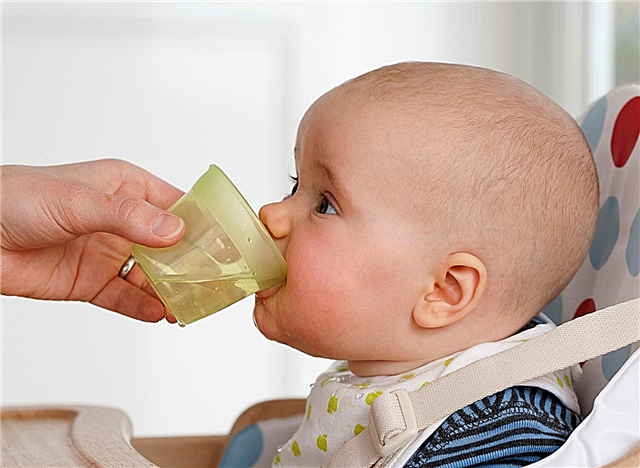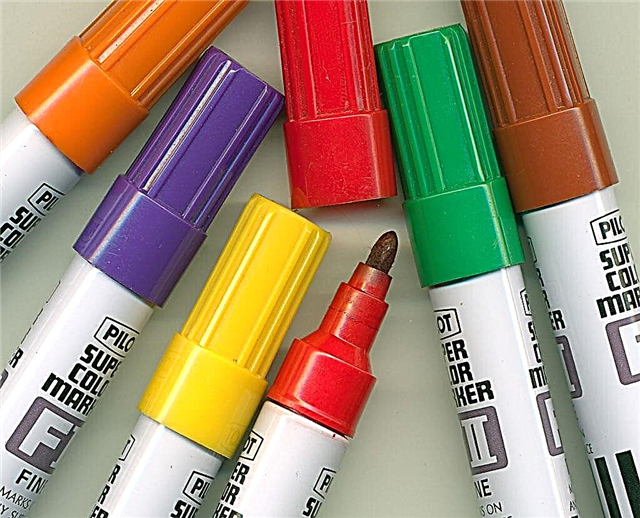Every mother makes sure that her child grows up healthy and strong. It is believed that for this, it is necessary, first of all, to provide your child with adequate nutrition. However, few give due importance to the simple yet reliable health promotion of young children - water. Meanwhile, pediatricians pay attention to the importance of organizing the correct drinking regime and explain how and how much water a baby should drink.

Water is essential for promoting the health of young children
The importance of drinking regimen for babies
Children's specialists have long proved that water has a beneficial effect on the health of babies, taking an active part in vital processes. Regular consumption of a sufficient amount of liquid improves metabolism, maintains normal body temperature, reduces the risk of allergic reactions, strengthens the immune system and has a positive effect on the health of the baby.
Dehydration, which leads to the appearance of many diseases, is especially dangerous for the child's body. For example, a lack of drink when the body temperature rises or on hot summer days negatively affects sweating, kidney function, gastrointestinal functions, and opens the way for infections and allergic manifestations.
Therefore, proper fluid intake is so important for a young child. In order to avoid many problems when raising a baby, pediatricians have to constantly explain to mothers how to correctly draw up a drinking regimen at home and how much water a child needs to drink per day.
What can you give a baby to drink
Experts warn parents that their health and well-being will depend on what kind of water they offer to drink to the baby.
Important! Ordinary tap water can be dangerous for a baby, even if boiled for a long time. It is undesirable to use bottled water intended for adults.
Experts explain that other regulatory requirements are imposed on children's drinking and water for preparing food for infants than to the usual drinking water for everyone:
- Water intended for infants must have a balanced mineral composition. For example, the amount of salts and their concentration in children's water, according to medical standards, is significantly lower than in water for adults;
- The liquid should not contain preservatives such as carbon dioxide and silver;
- If a bottled form is used, then the label must necessarily indicate that the water is intended for baby food. In addition, information is needed that this is a product of the highest category, registered with Rospotrebnadzor.
Note! Some manufacturers do not have information that this is a product for baby food precisely because of the high regulatory requirements.

For a baby, water must meet certain regulatory requirements
Choosing the right drinking water for your baby
Realizing the importance of the selection of water for their child, mothers anxiously ask what water is best for small children to drink. Artesian water is considered to be the most ideal for baby food, which is extracted in ecologically safe areas. However, it also has to undergo additional cleaning before filling.
Note. Often, labels depicting snow-capped mountains or crystal lakes, confirming the naturalness of drinking water, are common advertising. You need to be extremely careful, since the choice of bottled product in supermarkets is huge, but the products of many manufacturers are simply contraindicated for children.
Experts offer a list of the necessary criteria for choosing water for young children:
- The drinkable product must have increased softness, have a low mineral content;
- A carbonated product is contraindicated not only for infants, but also for older children;
- It is recommended to purchase a product for children in glass or polycarbonate bottles, which is confirmed by the number seven in the triangle on its bottom. Other types of plastic are unacceptable for babies, especially PC (polycarbonate) and PET (polyethylene terephthalate);
- It is best to buy water, which is bottled in containers with a volume of 0.33-5 liters, as it can be used up faster. Experts warn that you can store an open bottle in the refrigerator for no more than three days. According to the majority of pediatricians, it is recommended to use it within 24 hours;
- Pay attention to the name of the water, in which the term "children's" must be present, and the label indicates at what age it can be given to the baby;
- It is also necessary to check the availability of the date of manufacture, expiration date and storage rules.
Use of spring water for children
The attitude towards the use of spring water in baby food is ambiguous. Some parents believe that water sources located in an ecologically clean place, with healing properties and good taste, will be useful for babies. However, doctors warn that open sources can be saturated with microbes, harmful impurities, heavy metals, contaminated with clay, earth.
Important! It is extremely dangerous to give children water from springs, since such a liquid can lead to poisoning and become a source of dangerous diseases for the child: urolithiasis, gastrointestinal disorders and others.

Spring water is dangerous for small children to drink
Signs of dehydration in infants up to a year
One of the main functions that water is given is not only to benefit the child's body, but also to prevent dehydration, which can be caused by many reasons.
According to pediatricians, signs of dehydration are a serious threat to the metabolism and growth of all organs in a child's body. Parents need to understand the clear health risks of dehydration for their child. Therefore, in order to avoid many of the problems associated with dehydration, it is beneficial to form a habit of drinking water from early childhood.
The main signs of dehydration that every mother needs to know are highlighted:
- Dry diaper even after 6-8 hours of sleep;
- Anxiety in the behavior of the baby, frequent crying;
- Rare blinking of eyes, lack of tears;
- Discoloration and pungent smell of urine;
- Dry and pale skin;
- Dry lips and mouth;
- Greedy and hasty drinking.
Is it possible to give water to a newborn
Mothers often ask pediatricians if they need to give water to newborn babies, but doctors do not have a consensus on this question. Some experts say that babies do not need additional fluids, since they receive up to 90 percent of it in breast milk. Indeed, thanks to the enzymes it contains, breast milk promotes proper digestion, and the mother's unsaturated "front" milk satisfies the baby's need to drink, satisfying the thirst well. Therefore, it would seem that it is not necessary to give additional drink to a newborn with HV. However, other pediatricians say that, despite breastfeeding, the baby needs to drink water.
Important! Answering parents how much water a child should drink at 2 months, doctors warn that up to three months, children should be given a certain amount of water only on medical advice. You can and should drink four-month-old babies all the time. At six months and older, water consumption increases.
The opinion that this will entail the abandonment of the infant's breast has not been proven. Mom should remember that newborns have metabolic processes, that is, metabolism, rather quickly. Based on this, there is a significant loss of fluid, which can lead to dehydration.
When artificially or mixed feeding newborn babies with milk formulas or the introduction of complementary foods, babies, as a rule, need additional drinks. Lack of fluid with willow saturated mixtures can cause constipation and worsen the well-being of babies. It is necessary to give water to children so that it helps to empty the intestines and stabilize the general condition. Infants should be given a small dose of two to three teaspoons after meals.

With artificial feeding, the child needs additional drink
During illness, with high fever and colic, pediatricians recommend that children drink plenty of fluids. Colic is very easy to diagnose by a tense tummy, tucked legs and anxious behavior of the baby. Two or three sips of warm water with hiccups can be given even to one-month-old babies.
Drinking rate per day for a child up to a year
The drinking needs of the child's body differ from the adult norm. Therefore, parents ask themselves questions: how much water to give to the child, and what is the rate of its consumption per day. In this case, it is important not only the amount of liquid, but also its quality indicators.
Doctor Komarovsky explains to the parents how much it is worth giving the child to drink in order to fully compensate for the loss of fluid. He believes that its volume is determined by how much fluid the baby loses.
In his opinion, the main losses of water by the body are in the moistening of the inhaled air, urine and sweating. The warmer and drier in the room and the warmer the child is dressed, the more fluid he loses, therefore it is more useful for him to drink plenty of fluids.
Council. At the same time, Komarovsky warns against boiling water, since this destroys not only pathogenic microbes, but also precipitates the salts dissolved in it, which are necessary for the child's body.
WHO has developed daily fluid intake rates depending on the age of the baby. The main emphasis is on how much water a child should drink at 6 months and older:
- From six months to a year - 50 ml of water per 1 kg of weight is considered the norm. The total volume of fluid consumed includes water entering the body not only with drinking, but also with food;
- From a year to three - the liquid can be given almost without restrictions, since the baby is actively awake and moving. Normal fluid intake at this age is from one to one and a half liters per day.
Monthly table
According to WHO, there are norms for the daily fluid requirement of a child up to a year, which are set by months. Parents can calculate the average daily water intake for their child using the following formula:
liquid used in nutrition (breast milk or formula in ml × 0.75) is subtracted from the need for fluid (baby's weight in kg × 50 ml).

It is necessary to organize the correct drinking regime for the baby.
The consumption rate, depending on age and body weight, is approximately as follows.
Baby's water intake by months
| Age per month | Amount of water in ml |
|---|---|
| up to 6 months | 150 ml |
| 6 to 9 months | 250 ml |
| 9 months to 1 year | 350-400 ml |
| 1 year to 3 years | 500-750 ml |
Important! When determining the needs of their baby in the use of liquid, parents should understand that in a particular case, the calculation is individual. Each mother intuitively feels how much water her child should consume, but at the same time does not forget that he receives up to 75 percent of the liquid both with milk and with other food.
Infancy is a rather difficult period, since the baby cannot communicate his needs. Therefore, special attention must be paid to the needs of the baby. If it is difficult for a mother to determine how much water a child should drink in the first and second half of the year, it is useful to use the pediatrician's recommendations or to look closely at such signs as dry lips and skin, rare urination. Then the child's water balance can be easily ensured.



